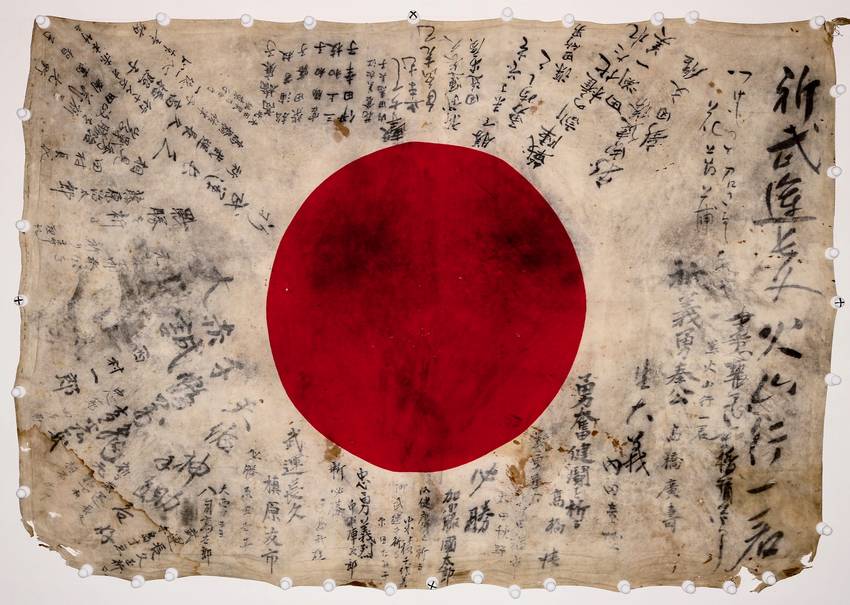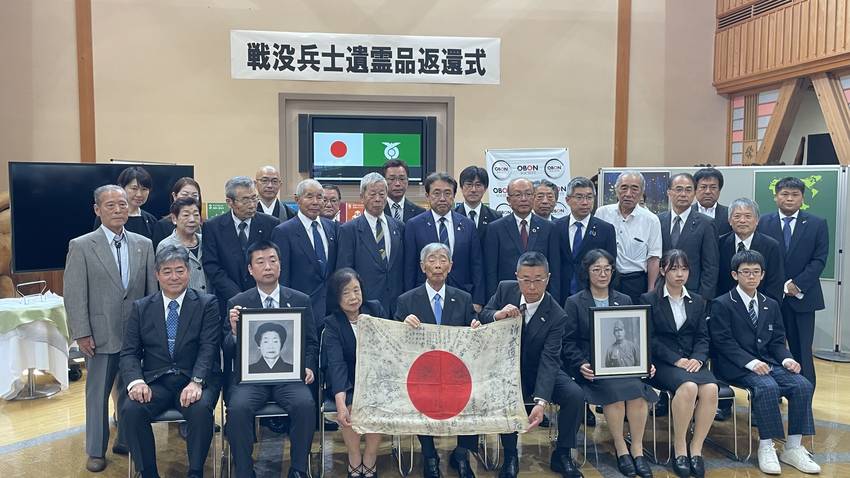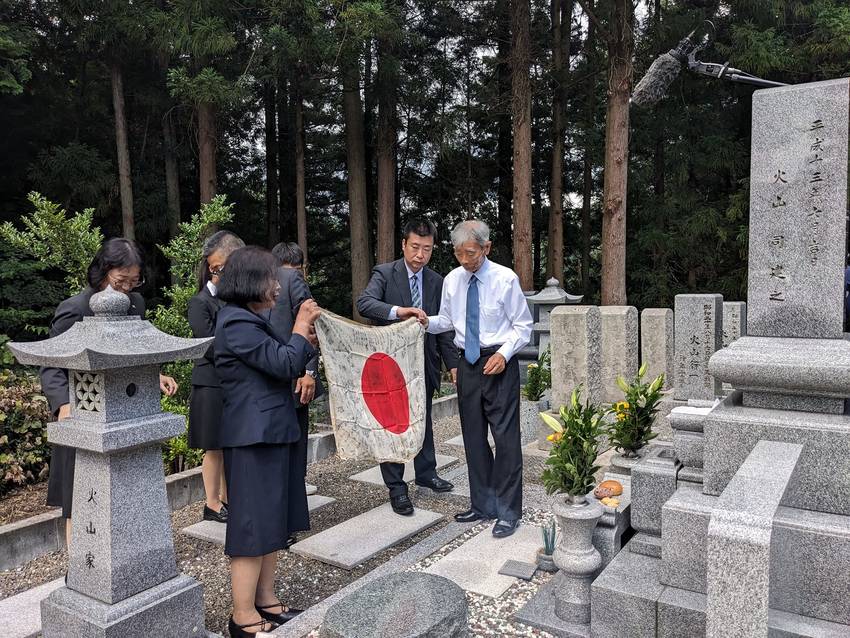【Smithsonian Magazine】A Japanese Soldier’s Son Receives a Memento of His Father, Who Was Killed During World War II
2024-09-23


The so-called good-luck flag, which hung on an American veteran’s wall for many years, returned home last month after nearly eight decades
During World War II, many Japanese soldiers carried good-luck flags, which featured handwritten well wishes from friends and loved ones. They varied in size but were usually small enough for their owners to fold up and wear inside their uniforms. They also happened to be an item that Allied soldiers collected as battlefield souvenirs.

After inheriting the flag from his grandfather, Scott Stein decided to return it to the descendants of its original owner.
Tsukasa Hiyama, who is holding the flag, poses with his family and community members during the return ceremony.

Tsukasa Hiyama unfurls the flag at his mother's grave.
A Japanese Soldier’s Son Receives a Memento of His Father, Who Was Killed During World War II
The so-called good-luck flag, which hung on an American veteran’s wall for many years, returned home last month after nearly eight decades
On the day Asae Hiyama gave birth to a son, her husband left to serve in the Imperial Japanese Army.
It was the summer of 1943, and the young couple had been married for a year. Asae waited dutifully until 1945, when she learned that her husband, Yukikazu Hiyama, had died in China. Officials said that he had been killed in combat, but Asae never received his remains or any of his possessions.
Without any material confirmation of Yukikazu’s death, Asae felt as if he had vanished. Their son, Tsukasa Hiyama, grew up knowing very little about his father, though he thought of him often.
“Since childhood, I often imagined what my father was like,” Tsukasa, now 81, tells the Washington Post’s Cathy Free. “What kind of person was he? What did he smell like?”
These questions lingered, but Tsukasa received few answers. He and his mother rarely spoke about Yukikazu. At the same time, Asae seemed to believe that he might one day walk through the door. Up until her death in 2000, she never received the closure she needed.
Then, in April, Tsukasa got a phone call. Researchers had identified a Japanese flag that had belonged to Yukikazu. They had been working for years to track down Tsukasa, who had never possessed a memento of his father.
During World War II, many Japanese soldiers carried good-luck flags, which featured handwritten well wishes from friends and loved ones. They varied in size but were usually small enough for their owners to fold up and wear inside their uniforms. They also happened to be an item that Allied soldiers collected as battlefield souvenirs.
One of those soldiers was Bernard Stein, who served in the Philippines with the United States Army’s 38th Infantry Division. When he returned from the Pacific, he brought Yukikazu’s flag home with him and hung it up in his den.
“He never talked about his wartime experiences,” Bernard’s grandson, Scott Stein, tells Stars and Stripes’ Seth Robson and Hana Kusumoto. “He must have seen some intense stuff in the war, but there were no mental health things when he returned. He just kept it bottled up.”
Scott has distinct memories of seeing the flag on the wall as a small child. He wondered where it came from, but like Tsukasa, he rarely asked about such matters. Still, he sensed that the flag was important to his grandfather.
“I would stare at it in fascination,” Scott tells Fox 5 New York’s Jennifer Williams. “My grandfather told me one day that it would be mine.”
When Bernard died, Scott inherited the flag, which he initially hung on his own wall. Eventually, however, he took the war souvenir down and stored it away. “I started to realize a while back that maybe it wasn’t the best home decor,” he tells the Post. As time passed, he also realized that he didn’t want to pass the flag down to the next generation. Instead, he wanted to send it home.
Around 2017, Scott learned about the OBON Society, an Oregon-based organization that works to return missing good-luck flags and other belongings to the families of Japanese soldiers. Since it launched in 2009, the group has identified the rightful owners of more than 600 flags.
When the researchers received Scott’s flag, they spotted numerous clues: Yukikazu’s full name is written on it, as are the names of his well-wishers. Still, it took them a long time to find Tsukasa, who lives in Tottori, Japan’s least populous prefecture. He has no siblings, as his mother never had any other children.
“She never remarried because she never believed her husband was dead,” Rex Ziak, the OBON Society’s president and co-founder, tells Smithsonian magazine. “She always expected him to come home to her and held that hope until her final breath.”
At a ceremony last month, Tsukasa accepted his father’s flag. He invited dozens of friends, family and community members to witness the return. Some of them had their own connections to the artifact, as their ancestors’ names are featured on it, too.
“The return of my father’s flag has brought a significant sense of closure,” Tsukasa tells the Post. “When I held the flag in my hands, it felt as if I could sense my father’s warmth for the first time.”
He also brought the flag to his mother’s gravesite, where he unfurled it as his wife and family looked on. After all these years, a memento of Asae’s husband had finally come home.